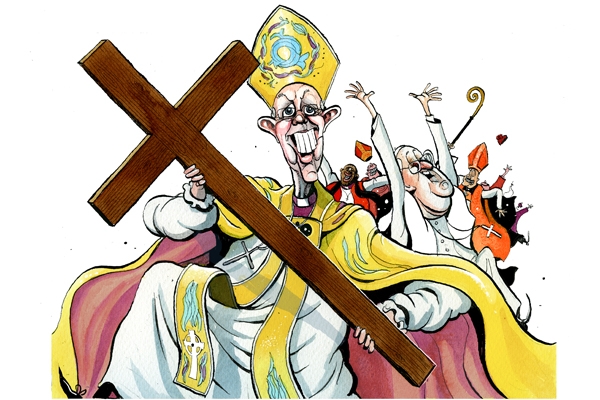The Church of England has had some surprisingly good press recently. Who knows how these things happen, but the media seems to have decided to stop attacking its homophobia, and to start praising its social vision. The change at Lambeth Palace seems to have prompted this shift, which is a bit ironic, as Justin Welby is far more involved in the sexually illiberal side of Anglicanism than Rowan Williams was, but never mind. It has also been prompted by persistently hard economic times: the Church’s involvement in deprived communities gradually wins it more attention. Maybe it has insights that normal political bodies lack.
Would you believe it? Some of the Church’s recent pronouncements seem to have penetrated the hardened atheism of two of the Guardian’s sassiest columnists. A few weeks ago Marina Hyde declared that she had a ‘crush’ on the new Archbishop of Canterbury, following his tough words about payday loan companies. And last week Zoe Williams declared herself similarly smitten by the Church’s stand against fracking. She said this: ‘I find my lack of faith ever more tested by a church that acts more like an opposition than the opposition.’
These are remarkable statements that should excite feelings of reverent wonder in all Christians. Ms Hyde’s emotional attraction to the archbishop surely betokens a spiritual attraction to the person of Christ. Even more stunning is that the issue of fracking has proved an occasion of grace, opening Ms Williams’ mind to the divinity of our Lord. For what else can it mean, that her lack of faith is being tested?
Or maybe these writers are just sassing around, in their normal charming manner, and are not really rethinking their atheism. I might seem to be taking a couple of hyperbolic comments rather too seriously, but there’s a serious point here. The Church can fairly easily make political interventions that please the left, and receive some pleasant pats on the head. But what do these endorsements amount to? The Church does not exist to persuade people that it’s a force for social good. It exists to persuade people that the worship of Jesus Christ is a good idea. This is a taller order. How on earth can it make Christian worship seem the most important thing in the world? It is naturally tempted to put that vexingly difficult question aside, and focus on an easier one: what sort of things should it say about politics so as to win the vague approval of people like Ms Hyde and Ms Williams?







Comments